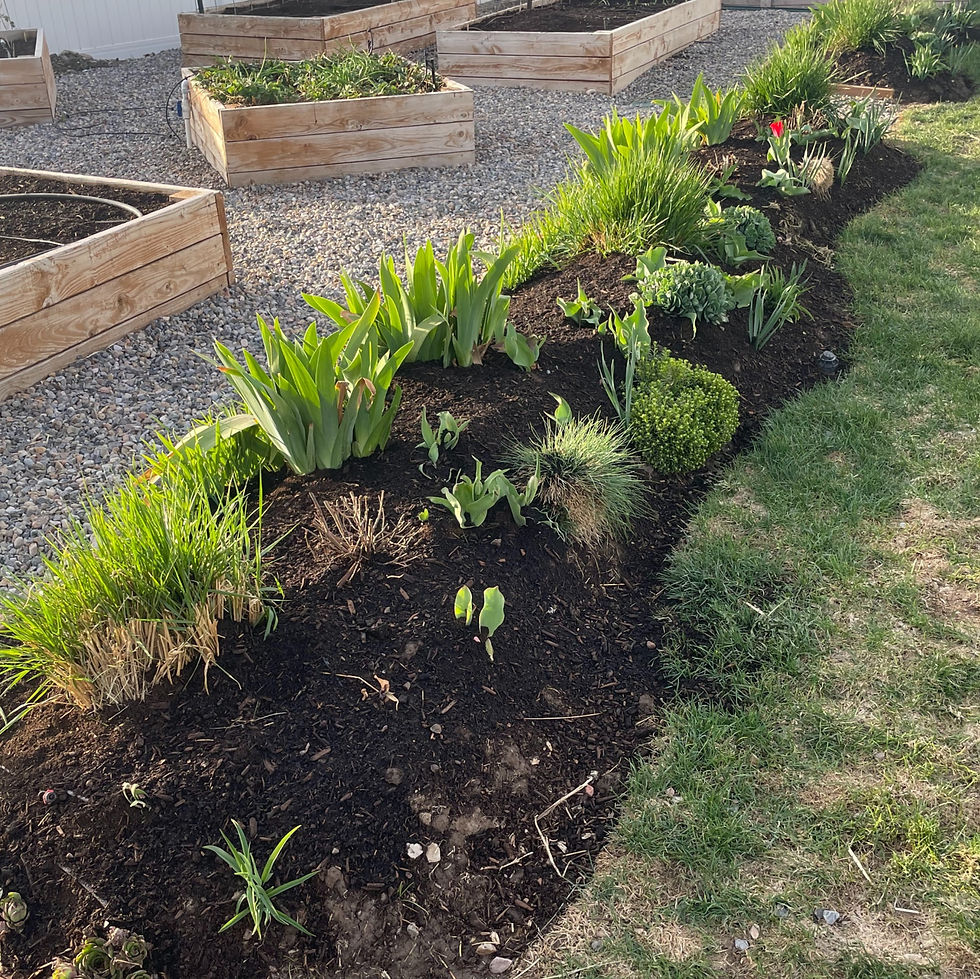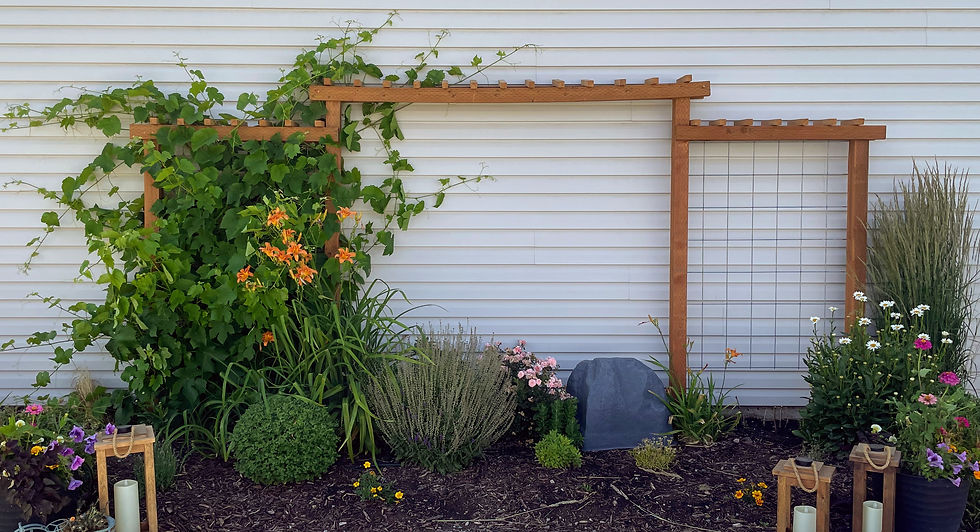Hey there, fellow gardenistas! Let's talk about one of the biggest challenges we face when creating a beautiful flower bed: pesky weeds. We all know they can be a real pain, competing with our beloved perennials for essential resources and nutrients. But fear not, I'm about to let you in on the two steps that can help you combat weeds and help you grow lush flower beds.

When I designed my flowerbeds, I wanted large, lush plants with abundant blooms of color to flourish, but I did not want to spend hours upon hours weeding. I stumbled upon two of my favorite secret weapons for a lush flowerbed with few to no weeds and I've never looked back! Every spring, I implement these two steps and I'm proud to report, I am able to spend only a few minutes each season weeding. My plants are healthier than ever before with tons of blooms and I don't have to break my back to ensure my flowerbed isn't overrun with weeds.
Step One: Compost
When it comes to your plants, one of the best things you can do to ensure large, healthy plants is to incorporate compost into your flower bed. Not only does it provide essential nutrients that plants need to grow, but it also improves soil health and helps retain water. Plus, it promotes healthy microbes that contribute to a thriving, mulch-covered flower bed.
Now if you're new to gardening, you might be saying: "What in the world is compost?"

Compost is essentially a mix of decomposed organic materials that have been broken down over time by microorganisms like bacteria, fungi, and even earthworms. These materials can include things like kitchen scraps--such as fruit and vegetable leftovers, grass clippings, leaves, wood chips, and even paper products like newspaper or cardboard.
When you add compost to your soil, you're infusing it with all sorts of good stuff, like nitrogen, phosphorus, potassium, and more. This helps to create a nutrient-rich environment that can help your plants grow bigger, stronger, and healthier. And, as an added bonus, composting is an eco-friendly way to reduce waste and put natural resources back into the earth.

For those gardeners who don't have the time or space to compost their own kitchen waste, using store-bought compost, such as chicken or turkey mulch, can be a convenient and effective way to add the nutrients your plants need. These products are typically made from a blend of organic materials, such as animal manure and plant waste, that have been broken down and processed into a nutrient-rich soil amendment. Simply apply a layer of compost to the top of your flower bed and gently work it into the soil. This will help to improve the soil structure, increase water retention, and provide essential nutrients for your plants to thrive. Just be sure to follow the manufacturer's instructions and avoid over-applying, as too much compost can actually harm your plants.
While compost is an excellent way to add nutrients to your garden and flowerbeds, it's important to be aware that it can also contain weed seeds. This is because the organic matter used to make compost often comes from various sources, some of which may have contained weed seeds. If these seeds are not properly broken down during the composting process, they can survive and germinate in your garden or flowerbeds. To minimize the risk of introducing new weeds to your garden, it's recommended to use compost that has been thoroughly processed and screened to remove any potential weed seeds. Additionally, be sure to avoid composting any weeds that have gone to seed, as this can lead to a buildup of weed seeds in your compost.
In my personal flowerbeds, I often opt for a cheaper alternative for compost in my area that has lots of potential for weed seeds. So how do I keep my weeding to a minimum each year?
Step Two: Pre-emergent
Pre-emergent is a type of herbicide that works by preventing weed seeds from germinating and growing. When applied to soil, pre-emergent forms a barrier that inhibits the growth of weed roots as they try to establish themselves. This is an effective method for controlling weed growth, as it targets the problem at its source and prevents the need for laborious manual weeding later on. Just remember, timing is crucial when it comes to using pre-emergent herbicides as it only works on seeds that have not yet germinated, so it's crucial to apply it before weed seeds have a chance to sprout. Additionally, pre-emergent must be watered in thoroughly to ensure it reaches the soil where weed seeds may be present.
If you prefer a safer approach to weed control, try using an organic pre-emergent herbicide. Organic pre-emergent herbicides are made from natural ingredients, such as corn gluten meal, which is a by-product of the corn milling process. Corn gluten meal works by inhibiting the growth of the roots of weed seeds, preventing them from taking hold and growing.
Other organic pre-emergent herbicides may be made from vinegar, essential oils, or other natural ingredients. It's important to note that while these products may be effective, they may not provide the same level of weed control as synthetic pre-emergent herbicides, and may need to be reapplied more frequently.

Composting and applying pre-emergent has been my secret weapon for beautiful, healthy flower beds with little to no weeding for years! While pre-emergent is a wonderful option for weed control, it's important to keep in mind that it will prevent any seeds from sprouting, not just weed seeds. So this product is one to use in flowerbeds but steer clear of using pre-emergent in your vegetable garden, specifically if you grow veggies from seed.
Remember, composting is a great way to give back to the environment by decreasing food waste while adding valuable nutrients to your flower beds. When purchasing compost, look for compost that has been thoroughly processed and screened for weed seeds. And when it comes to pre-emergent, timing is key, so be sure to apply it at the appropriate time for optimal results. By using these two secret weapons, you can look forward to beautiful flower beds without the backache from hours spent pulling those pesky weeds!
留言